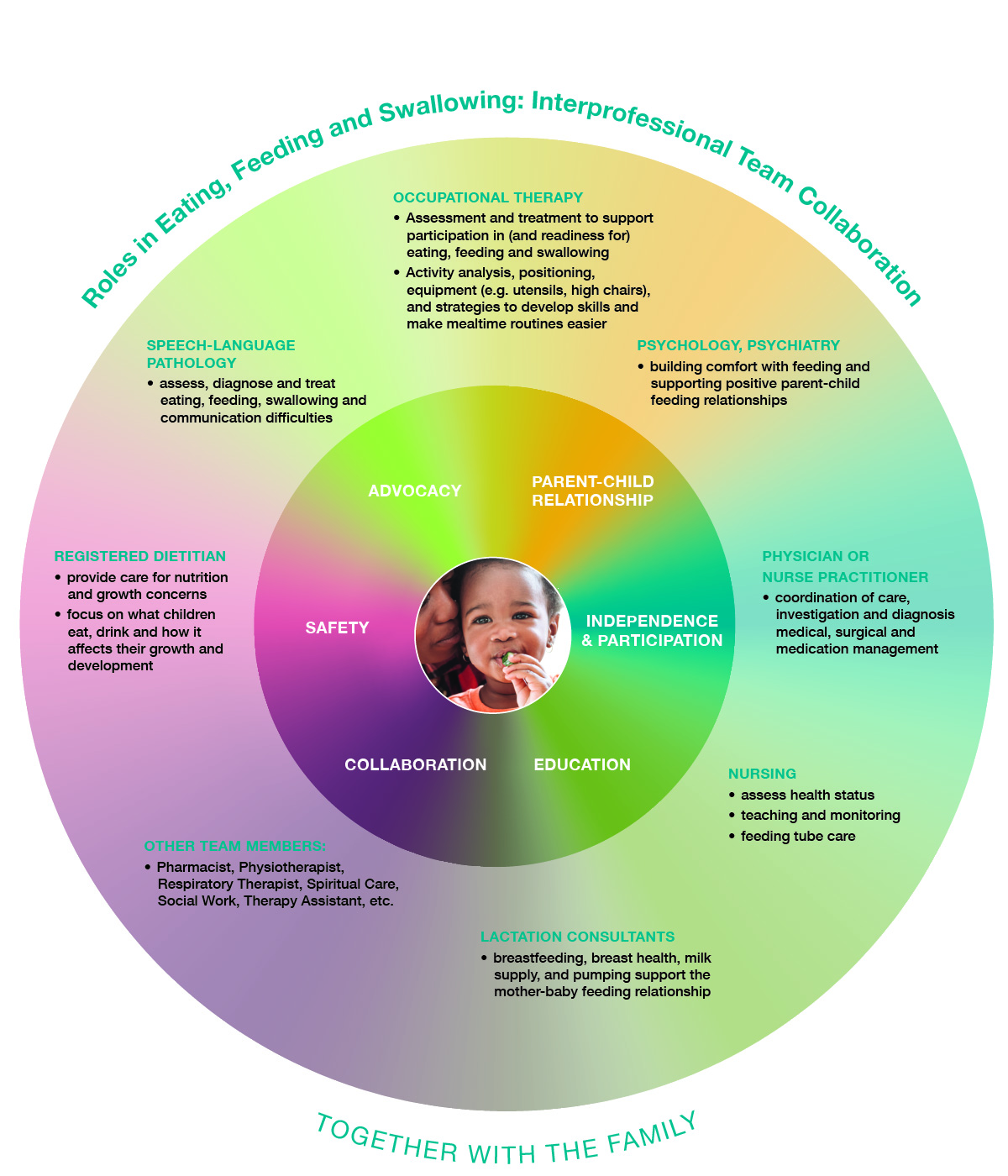Every child’s healthcare team is different, depending on your child's needs. Factors such as where you live and receive care also impacts who might be on your local team. If your child is accessing eating, feeding and swallowing services, members of your healthcare team will often help to coordinate care together with your child’s Primary Care provider (eg: pediatrician, family doctor, or nurse practitioner) and other professionals in your community to improve care planning, communication, and your experience.

- Registered Dietitians are uniquely trained in the areas of food, nutrition, growth, and health. They specialize in the assessment, diagnosis and treatment of nutrition-related concerns. They offer services and programs designed to, treat disease and disorders using nutrition therapy, as well as promote health and well-being.
- Occupational Therapists (OT) maximize clients’ level of independence and ability to succeed in meaningful occupations in their daily routines like feeding, which is a primary and essential routine.
- Speech-Language Pathologists (SLP) enhance both communication (speech production, receptive and expressive language, cognition, voice, resonance, fluency, and hearing) and swallowing, including related feeding behaviors.
- International Board Certified Lactation Consultants (IBCLC) are clinical experts in the management of breastfeeding and human lactation, and are trained to counsel mothers and families on initiation, exclusivity and duration of breastfeeding and to assist amidst any difficult or high risk situation.
- Nurses communicate with patients to determine their needs, and are advocates for patient health and safety.
- Licensed Practical Nurses (LPN) provide care for individuals, families and groups, in a variety of health care settings. They may practice independently or as part of a health care team.
- Registered Nurses (RN) provide professional nursing services, deliver health education programs, and provide consultative nursing services to promote maintain and restore patient health.
- Nurse Practitioners (NP) are registered nurses who have advanced training in health assessment, health promotion and illness prevention. They diagnose and treat health problems, order and interpret tests, and prescribe drugs.
- Physicians (medical doctors) are licensed to diagnose and treat patients’ disease, physiological and psychiatric disorders, injuries and other health related problems.
- Gastroenterologists (GI) are medical doctors who specialize in the diagnosis and treatment of diseases of the digestive system.
- Otolaryngologists (ENT - Ear, Nose, and Throat specialists) are medical doctors who specialize in the diagnosis and treatment of diseases or conditions of the ear, nose, and throat.
- Respirologists (Pulmonologists) are medical doctors who further specialize in the diagnosis and treatment of lung disease, such as asthma, emphysema, or pneumonia.
- Pediatricians are medical doctors who specialize in the care of children.
- Psychiatrists are physicians (medical doctors) who specialize in the diagnosis and treatment of mental illness and emotional disorders, and act as a consultant to other physicians.
- Family Physicians are medical doctors who specialize in the total health care of the individual and the family.
- Radiologists are doctors who order imaging tests, like X-rays, ultrasounds, and MRIs and interpret the images.
- Surgeons are medical doctors who specialize in evaluating people who have potential surgical problems and perform surgical operations and techniques.
- Pharmacists provide services and programs that are designed to promote health and well-being, treat disease and other disorders through drug therapy, wellness promotion, and disease state management.
- Physiotherapists (PT) assess and treat movement dysfunction and maintain or restore optimal function and quality of life.
- Psychologists study how individuals think, feel and behave from a scientific viewpoint, and consider the interaction of the mind, body, and behavior in health, illness, disability and rehabilitation.
- Respiratory Therapists (RT) facilitate evidence-based respiratory disease management programs that enable patients to successfully self-manage their condition and in turn improve quality of life.
- Social Workers advocate for social justice, human rights and equitable access to health and social programs, and help individuals gain access to information and resources.
- Spiritual Care providers offer spiritual, emotional and religious support to patients, families and staff during times of health crisis, isolation, suffering and vulnerability.
Sources:
AHS Core Clinical Activities for Allied Health Professions
AHS Insite: Overview of Clinical Roles in Alberta Health Services
MyHealth.Alberta.ca: Medical Specialists
- hospital based teams
- outpatient clinics
- specialized rehabilitation or therapy services
- transition services (transferring from Hospital to Home)
- home care or pediatric home care are very often involved with children who have feeding tubes, fragile feeders, etc.
- school based teams
- public health
- private healthcare providers
- other specialty clinics (eg: Cardiology, Neurology, Immunology, Endocrinology, etc.)
- dentists
- translation services
